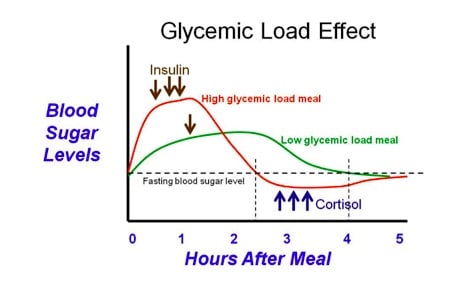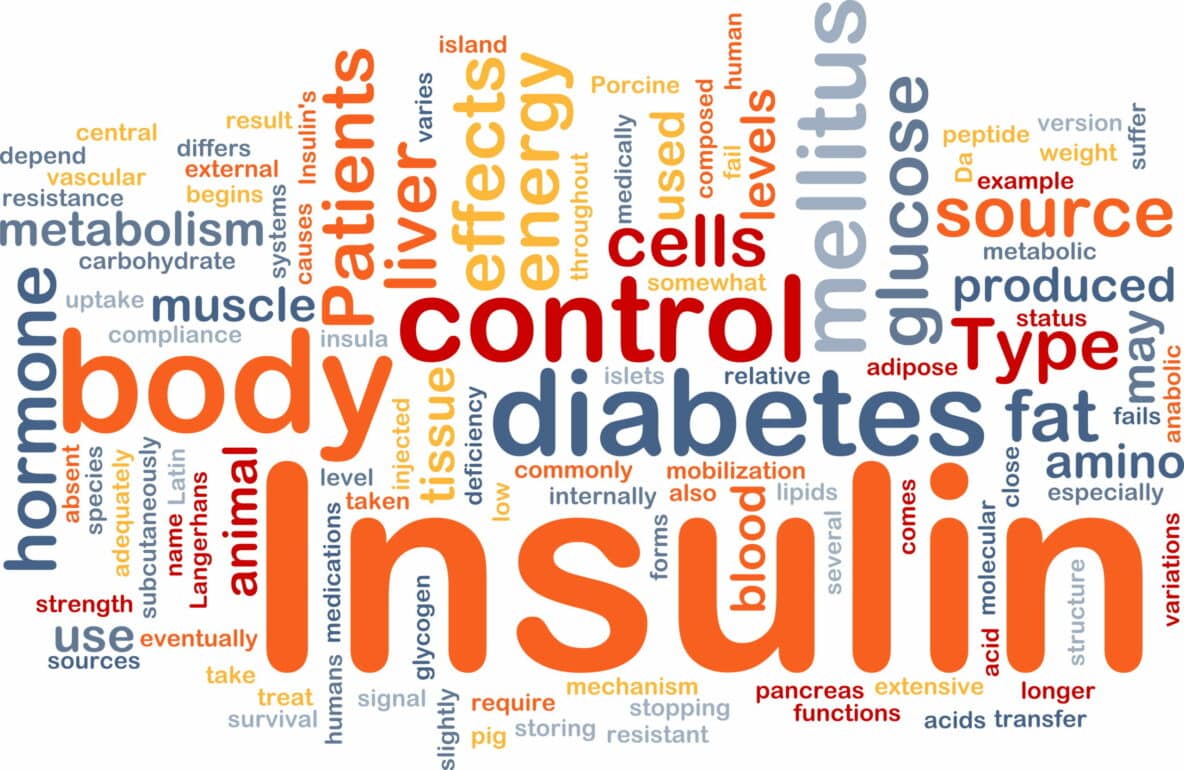That spare tyre around your middle – it just won’t go, no matter what diet you try or how much exercise you do?
Insulin is one of the hormones responsible. It’s our FAT STORING HORMONE! We absolutely need insulin – it has a life saving job of regulating our blood sugar levels, which need to be kept in a very narrow range, or it can be dangerous. But our diet and lifestyle can contribute to overly high levels of insulin, which can be problematic.
Insulin is released from our pancreas when we eat food containing sugar (not just sweet stuff, carbohydrates are just more complex sugars). Once the sugar is absorbed into our blood, insulin mops up the excess and takes it to the cells of our liver, muscles and fat to help move the glucose inside to use as energy. The liver and muscles take what they need and the rest is stored in our fat cells for future use.
Insulin and the blood sugar rollercoaster

When we eat too many carbs, the blood sugar surge stimulates large amounts of insulin, which in it’s super efficient job of removing the sugar can lead to a blood sugar crash a little while later (hypoglycemia), and another uncontrollable craving for a biscuit, pastry or bar of chocolate. And here we go again….!
This whole roller coaster ride is exhausting and puts the body under stress.
When you’re tired, stressed and just about getting through your day without wanting to kill someone, you might be relying on sugar, caffeine and alcohol to prop you up and numb the pain. Sometimes it seems like the only survival method. But this can just make everything worse!
The stress connection
Low blood sugar sends a stress signal to the brain, resulting in cortisol being released to get sugar back into our blood. Cortisol is our stress hormone, released when the brain perceives we are in some kind of danger, whether real like a lion attack or perceived like a traffic jam!
Not only do we have 4 times more cortisol receptors in our abdominal fat than any other fat, but cortisol stimulates appetite – sugar and carbs are vital when you need energy to run from that lion. But when food is readily available and there is no lion to run from, the sugar you have eaten doesn’t get used as energy and is stored away as fat.
So if you are either eating too many carbs or sugar, OR you are under some kind of stress, you are likely to have too much insulin in your system, and therefore a lot of FAT STORING and WEIGHT GAIN going on.
But it’s not just fat storing that we need to worry about….
Too much insulin can contribute to chronic diseases including;
- obesity
- diabetes
- inflammation
- osteoporosis
- dementia/Alzheimer’s
- hormone imbalance
- thyroid disease
- cancer
- heart disease
So how do we control insulin?
1/ Get off the rollercoaster! Ditch the sugar and refined carbs – eat a low Glycemic Load diet and balance your blood sugar. That means avoiding processed sugary foods and choosing slower release carbs like non-starchy vegetables, oats, brown rice, quinoa, beans, pulses, legumes.
2/ Eat protein with each meal (especially breakfast!). This helps to slow down the release of sugar, reducing insulin levels and keeping you full for longer, reducing cravings. Try these breakfast options for a great start to the day;
- Eggs with avocado and spinach
- Full fat live natural organic yoghurt, with berries, raw nuts and seeds
- A green protein smoothie made with unsweetened almond milk
3/ Eat fat to lose fat – healthy fats are vital for our cell membranes, brain function and hormone production. Fat also blunts the insulin response from a meal, reducing the impact of the carbs. Include healthy fats in your diet daily; oily fish (eg salmon, sardines, mackerel), avocadoes, coconut oil, olive oil, nuts, seeds, organic meat, organic full fat yoghurt and grass fed butter.
4/ Watch the alcohol – not only for it’s sugar content, but for the bad choices it tends to encourage! A glass of red wine is my tipple of choice (at least it has some antioxidants!).
5/ Limit snacking – Too much snacking can cause excessive insulin secretion. Stick to 2 or 3 ‘low GL’ meals a day.
6/ Move more – exercise helps insulin do it’s job effectively so we don’t need as much. It also helps build muscle so that we can use up more sugar as energy.
7/ Add a teaspoon of cinnamon daily – cinnamon has been shown to help to regulate blood sugar levels.
8/ Slow down & chill out – reducing stress is so important for weight loss, and general health for that matter! Too much cortisol will keep that tyre around your middle, and put you at higher risk of fatigue, heart disease, diabetes and cancer. Try stress reduction techniques like meditation, mindfulness, deep breathing, yoga, walking in nature, Epsom Salt baths or anything that relaxes you.
9/ Get enough sleep – lack of sleep has been shown to increase appetite hormones! And when we’re tired and stressed out, our healthy food choices go out the window. Try these tips to help you get a good night’s sleep.
10/ Supplements can be helpful – magnesium, chromium, Alpha Lipoic Acid, Vitamin D, zinc, berberine and adaptogenic herbs for stress have all shown potential benefits for blood sugar control. (Do check with your Dr or health practitioner before taking any new supplements). Check out my collection of recommended brands.
11/ Overnight fasting or time restricted eating can help to increase insulin sensitivity – and therefore blood sugar regulation.
So if you’re struggling with weight loss and the diets aren’t working, try getting your insulin under control.

